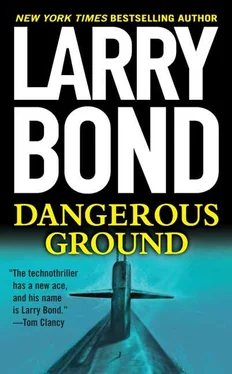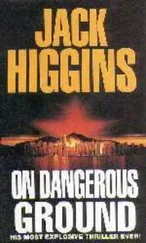“Imagine how we’d feel if a Russian submarine went snooping into the Chesapeake Bay. How would our Navy react?”
“It’s going to be hard to type lying down,” Patterson declared resignedly, then left, with Davis following her. As she left, Bair said, “It shouldn’t be too long — this time.”
The signal from the Bear faded completely a few minutes later without changing course. They waited thirty minutes, the tension gone but prudence still in charge, then secured from ultra-quiet. They resumed normal transit speed, but Jerry sensed a different mood in control: not grimmer, but quieter and more focused. From here on they could expect to encounter Russian units at any time.
* * *
It was almost the end of his watch before anything else happened to break the quiet. Jerry looked up from his quals book as sonar announced, “Conn, sonar, new contact bearing one six zero degrees. Designated new contact sierra seven seven. Contact is a distant active warship pinging with a medium-frequency search sonar. Probably a patrol craft.”
Holtzmann told Jerry, “You make the report to the Captain this time. I’ll get us quiet.” As he gave the orders to reduce speed and rig the boat for ultra-quiet, Jerry picked up the phone, dialed the Captain, then repeated sonar’s report.
Hardy replied, “Thank you, Mr. Mitchell. What are your recommendations?”
Jerry replied, “Continue on base course, sir.”
“Because a medium-frequency sonar has a relatively short range?” Hardy prompted.
“Yes, sir.”
“Wrong answer, mister!” Hardy’s voice was harsh. “Order a turn to the north right now, new course zero two zero. I’ll be there in a minute. See if you can figure out by then what your mistake was.”
Puzzled, Jerry put down the phone and told the OOD about the course change. Holtzmann let him issue the order and then asked about Jerry’s expression. “I recommended that we stay on course, but the Captain said that was wrong. I don’t understand why. Russian patrol craft all have short-range sonar, and he’s not even close to us.”
“All true,” Holtzmann replied. “But what time of year is it?” he asked.
“Summer,” Jerry answered, confused by the question.
“In the Barents,” Holtzmann continued. “It’s a short summer up here. The weather’s decent, and the Russians cram a lot of exercises into these few months. Now, we know there’s a patrol craft out there pinging, but he’s too far away to be pinging for us. So what’s he pinging for?”
“A Russian sub.” Jerry answered, beginning to understand.
“Exactly,” Holtzmann confirmed. “There’s a decent chance that a patrol ship is getting practice on a live sub or that a sub’s getting practice with a live pursuer, probably both. Now the patrol craft can’t pick us up this far away, but if there’s sub around, then we are in an entirely different ball game.”
Hardy arrived as Holtzmann finished his explanation. “Anything more from sonar, Mr. Holtzmann?” Hardy asked.
“Sonar reports a single pinger only. They evaluate it as a Bull Horn sonar, bearing correlates with a passive sonar contact, possibly a Grisha. But it’s not a single contact. They’re getting several similar passive contacts, all close together, all with a very slow right bearing drift.”
“A group of ASW patrol craft,” Hardy concluded, “with one conducting an active search.” He stepped over to the intercom and pressed the switch. “Sonar, conn. Sort out those passive contacts and make damn sure they are all surface ships. And keep a sharp eye to the south for anything that might not be a surface vessel.”
“Conn, sonar aye” came over the speaker from sonar.
Hardy turned back to face them, but his explanation was for Jerry. “Individually, a Grisha or a Parchim isn’t much of a problem. A couple of short-range sonars, ASW rocket launchers, and ASW torpedoes. We can outrun one or sink it with one torpedo. But they hunt subs in packs, usually in groups of three or four. They spread out in line abreast and march back and forth across a swath two dozen miles wide. They also like to work with ASW aircraft and helicopters. Right now, they’re practicing how to hunt us. We’re going to do our best to avoid giving them a real target to train on.”
Hardy went over to the chart table to check the new course, then the fire-control display. “Mr. Holtzmann, assume an exercise area fifteen miles on a side, centered on the pinger’s current position, then add the detection range of a first-line SSN’s sonars. How wide is the danger zone?” Hardy sounded like he already knew the answer.
“I’ll assume an Akula II with a Skat-3 sonar suite,” Holtzmann answered as he brought up a detection/counter-detection program on the HP computer. “We’re ultra-quiet, so that roughly quarters the noise we are putting into the water.”
He punched in the data, then moved to show the display to Hardy as his finger traced a graph. Hardy shook his head. “Remember, mister, he’s trying to avoid detection as well. Assume he’s ultra-quiet, too.”
Chagrined, Holtzmann punched in the corrections, then followed another line on the plotted graph. Hardy nodded and said, “Add that distance to the size of the box and plot a course around it.”
“Aye, aye, sir.”
“And then figure out the distance we have to be from the box before we can secure from ultra-quiet.”
“Aye, aye, sir.”
* * *
Jerry and Holtzmann turned over the watch at noon, with the boat creeping north-northeast, away from the Russian exercise area. Lunch was cold cuts in the wardroom, eaten in almost total silence and with Jerry being careful not to scrape his chair across the deck. The two ladies were even more careful than the rest of the crew, speaking in whispers, setting down a glass slowly to prevent any sound.
They secured from ultra-quiet in mid-afternoon, and an almost tangible weight lifted from Jerry’s shoulders. Staying quiet wasn’t a hardship, or even difficult, but it meant being constantly aware and constantly careful. That awareness also included the presence of Russian forces, not really the enemy, but a dangerous and capable opponent.
* * *
Jerry came back on watch at six, after eating an early dinner. Although most officers would stand one watch section out of every three or four, Jerry had doubled up to get in the experience he needed in this one patrol. Sleep would have to wait until they got back home.
Memphis was on course and at transit speed, but there was something new on sonar. Lieutenant Commander Ho was OOD this time, and he steered Jerry to the sonar display. “Here’s something new,” he announced.
The waterfall display was filled with bright speckles, like a thin fog. The “fog” lay in front of them, and as he watched it move down the display, it widened slightly. That meant it was filling more of the horizon. They were headed straight for it. Into it.
“It’s the Marginal Ice Zone,” Jerry announced. “We’re picking up the sound of the ice floes as they melt and hit each other.”
“Correct,” replied Ho. “This time of year, you’ve got to go pretty far north to reach it. Implications?”
“Reduced passive detection ranges. And we have to be more careful when using the periscope, or any mast.”
Ho nodded. “And this is just small junk. They weigh less than a hundred pounds apiece. Later we’ll get into the bigger stuff.”
By the middle of the watch, they had entered the Marginal Ice Zone. The waterfall display was covered with tiny white specks, like slow-moving static. Above them, the ocean’s surface was littered with an ever-thickening cover of ice floes and a slushy mix of seawater and small ice chunks. To Jerry, everything felt the same, but now there was a roof on their world.
Читать дальше












